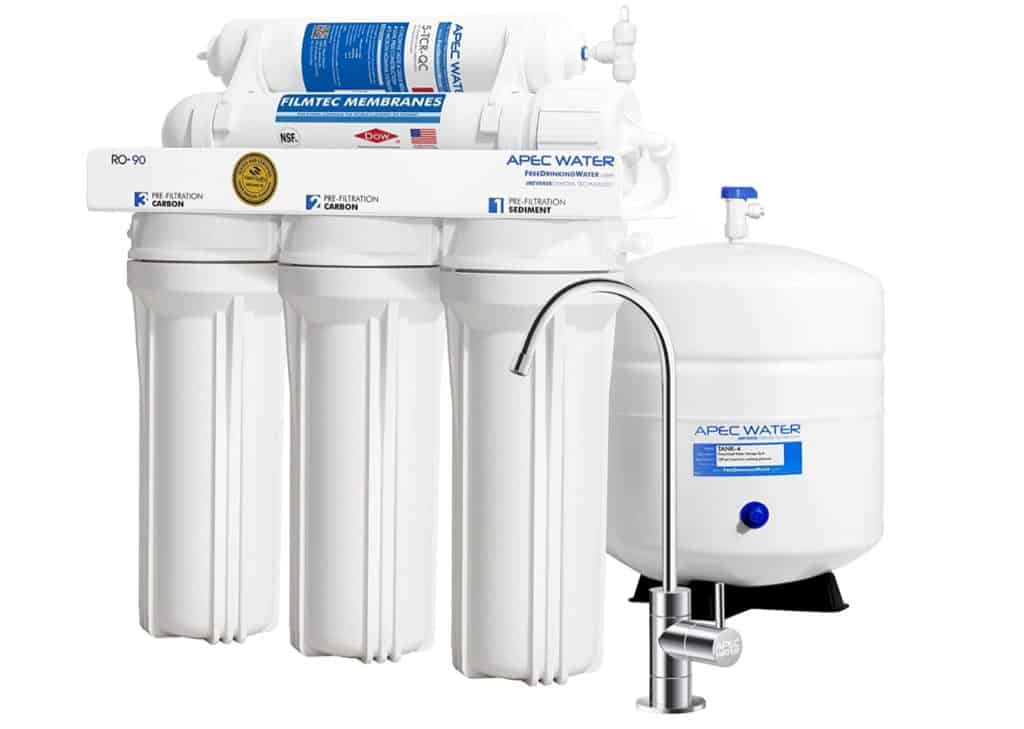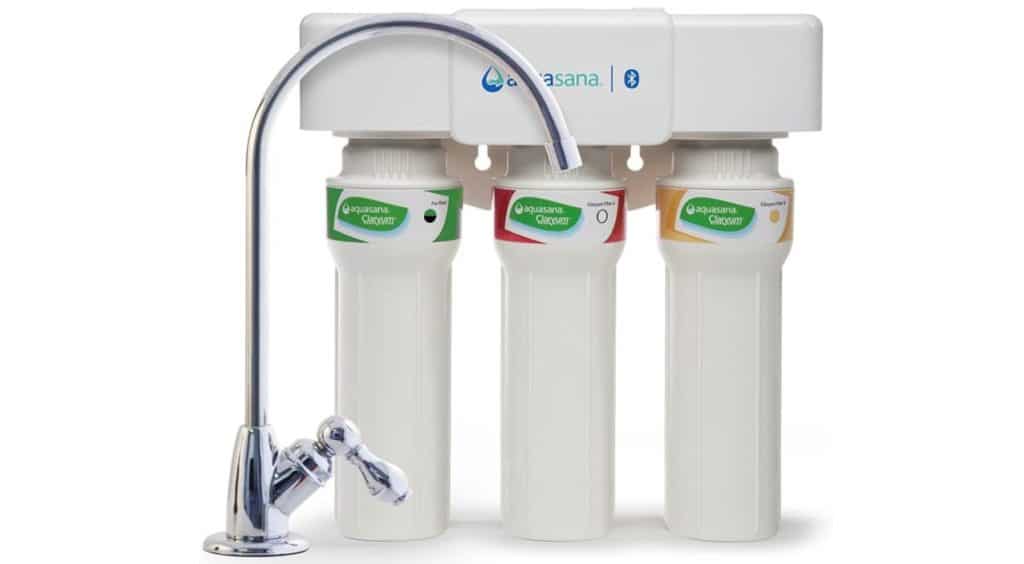Do you use a refrigerator water filter for your drinking water? Are you concerned that it’s not as good a filter as a full-sized, multi-stage filter or reverse-osmosis water filter?
Let’s dig into this important water filter situation.
Water Quality
Note that water quality standards are set forth in the US Code of Federal Regulations Title 41, Section 141. These detail water contaminants and water legislation that determines what defines “water quality.”
Drinking water shouldn’t be pure H2O but it should be free of heavy metals, pesticides, and similar contaminants. It should also taste good — clean, pure, and not salty, or tasting of salt or plastic.
Fridge Water Filters
Refrigerator-based water filters are incredibly convenient, but the question that arises is whether this is the best option. The concern is that filtering via your fridge might be better than no filtering at all but the quality of the water dispensed may not be as could as it could be, particularly with a larger, higher-end filter.
It is advisable to drink filtered water, like that which has gone through a full-sized water filter. One of the most popular choices is a reverse osmosis (RO) filter system — this is a good stand-in for a high-quality filter system– but how good of a filter do you really need?
A comparison between a refrigerator water filter and a filter that uses an RO system will provide more details. And again, we’ll use the RO system in place of any modern, high quality, ANSI/NSF-certified water filter system.
How A Refrigerator Water Filter Works
Many refrigerators have an inline filter that purifies the water and removes contaminants as it flows through the system. It is important to understand how this system works before comparing it to an RO-based system.
Most refrigerator water filters use carbon filtration which have a form of activated charcoal to remove contaminants from water. Activated charcoal is a type of charcoal that works on the principle of adsorption to filter water. Adsorption does not absorb impurities but instead binds them physically to the charcoal. This ensures some toxins and impurities are removed from the water.
The media used in the filter has tiny holes. These holes allow water to pass through while trapping impurities. One of the benefits of using carbon filtration is that it helps in removing the bad smell that is found in water due to chemicals like chlorine. The water supplied by the municipality is treated with chlorine to get rid of germs, but also fluoride and other minerals.
Carbon filtration is a simple process and not very expensive. The only maintenance needed is to change the filter once 6 months or so (perhaps more depending the amount of usage).
Carbon is great for improving water’s taste but not the best of removing all unwanted and even harmful chemicals from drinking water.
Carbon filtration is that it does not remove all impurities. For example, it cannot remove all heavy metals, which can be toxic. Fluorides are another type of impurities that cannot be removed, nor are these filters generally effective against arsenic, lead, and many pharmaceuticals in water cannot be filtered with carbon.
Is A Fridge Water Filter Good?
Most fridge water filters are primarily aimed at making water taste better. While this is admirable, it’s not the whole picture. If this has you questioning if your fridge water filter is effective, we are in the same camp.
How do you know if your fridge filter is effective? Look for an NSF/ANSI certification. This is like a seal of quality on the filter. An NSF 42 certification means that the filter is aimed at improving the taste of the water. An NSF 53 certification means the filter will also remove harmful chemicals and minerals, like lead. The most modern certification, NSF/ANSI 401, will also remove “Emerging Contaminants/Incidental Compounds” like pharmaceuticals and pesticides.
This is why a refrigerator water filter may not be very effective. If you are concerned about impurities and toxins in your water, then you should consider a better system. A water filter that works on RO is more effective.
Under-The-Sink Filter
A full-sized water filter system like an RO filter system or multi-stage water filter is usually better at removing chemicals and harmful minerals from water. These filters are large, so they need to be changed less often and they have higher flow rates so they won’t slow down your cold water too much.
A water filter that uses reverse osmosis is, on the whole, more effective than carbon filtration. The water this system provides ensures water that is cleaner and safe. This is why RO water filters are more popular and preferred by homes. Understanding how this system works will be helpful in knowing why this system should be preferred.

How Does An RO Filter System Work?
The reverse osmosis (RO) system also uses carbon filters for filtration but, unlike an inline water filter, it uses multiple carbon filters and also has a semi-permeable membrane to help it filter water effectively.
Here’s how the filtration process works:
- The water first flows through a sediment filter. This filter helps to remove impurities that are large in size. It also helps to remove some chlorine.
- Next, the system uses pressure to pushes the water into the semi-permeable membrane. This membrane can effectively remove most of the impurities like germs, calcium, sodium, urea, glucose, etc. Water, which is very tiny, is allowed to pass through but the impurities are caught by the membrane and then flushed away. This stage ensures the best possible purification of water.
- The the water is then water usually passes through more carbon filters. This ensures the odor is minimized and taste is improved.
- The filtered water then moves to a storage tank where the water is kept for use.
- When the tap of the filter is turned on, the water goes through one more stage, which is a carbon polishing filter. This filter ensures the water tastes great.
Why Use An RO Water Filter?
There are multiple benefits of using an RO-based water filter. It ensures better filtration, as compared to a carbon filter used in a refrigerator filter. There are many other benefits too:
Removes Chemical and Pathogens
Municipal water is usually quite good, but a lot can happen between the treatment plant and your home. Water can pick up contain viruses, bacteria, parasites, and lots more. An RO filter ensures these pathogens are completely removed. This helps in making homes safe from the risk of pathogens.
Removes The Maximum Amount Of Contaminants
Water can have contaminants like lead, sulfur, arsenic, and other heavy metals. These contaminants can be harmful. These dissolved contaminants cannot be seen or tasted. But their presence can be dangerous to humans. When an RO filter is used, it ensures that the maximum contaminants in water are completely removed. This ensures clean and safe water.
High-Tech Water Purification
RO filter uses advanced filtration technology to ensure the water you drink is safe. Impurities in the water can be of different sizes. The size is express in terms of microns. Some of them are so small that they cannot be removed using regular filters. This requires a special filter or membrane. This is where the semi-permeable membrane plays a key role. The process used here is reverse osmosis. In this technique, an impurity whose size is bigger than that of a water molecule can be removed.
It is Reliable
RO filters are durable and reliable. You can rely on these filters to work effectively ensuring the water you drink remains clean and safe. RO filters use the best filters and materials. This ensures it works the best.
Even though an RO filter is advanced, its maintenance is simple. All that is required to be done is to replace the filters. The manufacturer would provide a schedule for maintenance to ensure that the filter change is done on time to ensure it works well.

